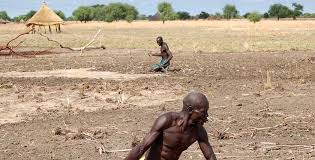The Ghanaian government late Monday announced mitigating measures against a looming food crisis as drought hits the country’s major farming areas.
Food and Agriculture Minister Bryan Acheampong announced at a joint press conference that droughts in July and August in the Northern Savannah Belt, which is a major source of grains in the West African country, would cause major food shortages.
According to Acheampong, 435,872 farmers cultivating about 871,745 hectares of land were directly impacted by the dry spell, widely stunting the production of maize, rice, peanut, soybean, sorghum, millet, and yam in the Northern, Savannah, North East, Bono, Bono East, Upper East, Upper West, and Oti Regions.
The minister also estimated that the affected farmers would lose 3.5 billion Ghana cedis (224 million U.S. dollars) in investments and a corresponding potential 10.4 billion cedi (665 million dollars) in revenue loss, with rippling effects on the poultry industry, which depends on domestic grains to produce feed for birds.
To mitigate the impact of the imminent food crisis, the minister announced an immediate ban on the export of maize, rice, sorghum, and soy beans from Ghana until the situation returns to normalcy.
“With immediate effect, the government is placing a ban on the export of grains, including maize, rice, and soy beans, until the situation normalizes. This measure will ensure the availability of these critical food items on the domestic market,” Acheampong told the media.
He added, “This ban is essential to safeguarding the food supply and protecting the interests of our farmers. We must prioritize domestic needs during this crisis.”
The food and agriculture minister said the government also intends to tap into the subregional grain reserves of the Economic Community of West African States and collaborate with the private sector to import up to 300,000 metric tons of maize and 150,000 metric tons of rice.
He said the government would also import 26,000 metric tons of poultry feed to support the poultry industry.
Finance Minister Mohammed Amin Adam said initial estimates indicate that Ghana needs at least 500 million dollars to prevent a food crisis.
“We are working to raise 500 million dollars to support our food security interventions. This will be a combination of contingency funds, budget realignment, and development partner financing,” Adam said.
He said the government has already secured 160 million dollars to support farmers during the crisis to lessen the socio-economic impact.
Ghana’s agriculture is largely rain-fed, and good rains in the middle of the year tend to boost crop production in the major farming areas across the country. But rains have been scanty in the major farming regions since late June.

